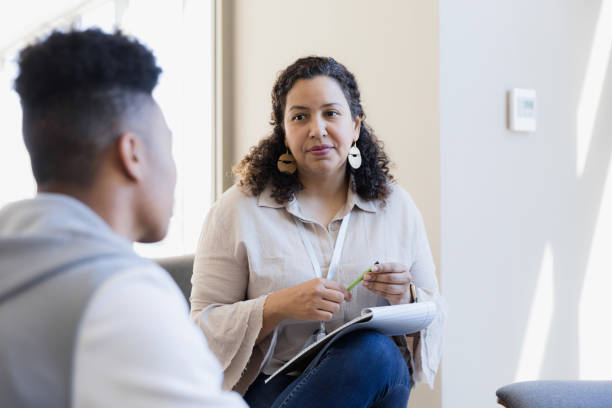How To Earn a Master’s Degree in Counseling in 11 Steps!
Counseling is a field that enables you to assist people in achieving their objectives, gaining access to mental health resources, and learning how to effectively manage adversity. To practice as a counselor, a master’s degree in counseling is required. If you wish to earn this Master’s Degree in Counseling, it can be helpful to understand the necessary stages and prerequisites.
This page explores the meaning of a master’s degree in counseling, the concentrations available, common careers, and how to obtain this degree.
What is a master’s degree in counseling

A master’s degree in counseling is a two-year program that teaches students how to provide counseling to a variety of patients and clientele.
This degree is essential to provide individual therapy and, depending on your area of specialization, may allow you to diagnose mental health disorders or prescribe medical treatments. Individuals with this degree can pursue careers in counseling or scientific research.
How to earn a master’s degree in counseling
The following procedures can be taken to earn a master’s degree in counseling:
1. Complete a bachelor’s degree program
Prior to applying to a master’s in counseling degree program, you must hold a bachelor’s degree from an accredited college or university. Some graduate programs may accept students from any undergraduate major, while others may demand a bachelor’s degree in counseling or a related discipline. In addition to a minimum 3.0 GPA, some colleges may have additional academic requirements.
2. Attempt the GRE

The GRE general test is another way to Master’s Degree in Counseling. It’s commonly utilized by graduate school admissions departments. It tests your fundamental analytical writing, verbal thinking, and analytical reasoning abilities. The exam can be taken at a certified testing center or online from the comfort of your own home. It may be repeated every 21 days, a maximum of five times per year.
3. Gain practical experience
In addition to earn a Master’s Degree in Counseling. Academic prerequisites, professional experience in a relevant field is often required for admission to graduate counseling programs. Experience may include aiding a certified counselor, working in a mental health facility, or completing an undergraduate internship. To improve your chances of being accepted into a school, you should look for employment or internships that you can list on your CV.
4. Select a concentration
Focusing on a certain area of expertise can help you select a school with outstanding programs in that sector. Your specialty may also necessitate additional credentials or specialized work experience. Before applying to a Master’s Degree in Counseling, you should determine your counseling concentration.
5. Research institutions
After completing the GRE and choosing a focus, you can begin studying Master’s Degree in Counseling. You may wish to investigate the program’s location, cost, concentration options, and overall quality. When evaluating schools, there are physical and online master’s programs to consider.
6. Acquire official documentation
The majority of graduate schools demand official transcripts from applicants. Some may require additional documentation, such as vaccination records or GRE scores. Typically, these documents can be requested from the registrar’s office of your prior institution.
7. Request recommendation letters
Many colleges require one to three letters of recommendation from the faculty or staff of your previous program. A recommendation letter assists admissions officers in understanding your abilities and how you may contribute to their program. Try to request a letter of recommendation from a staff member you know well at least three weeks before the letter is due.
8. Write a résumé or CV

In addition to your academic records, a Master’s Degree in Counseling program will typically need a résumé or curriculum vitae to assess your job experience. This helps you to demonstrate to the admissions committee your relevant internships, jobs, and volunteer experience. If you don’t have many counseling jobs to list on your resume or CV, you can highlight abilities such as empathy, organization, and attention to detail that may help you become a counselor.
9. Create a personal statement
A personal statement is a brief essay that describes your aspirations and explains why you wish to enroll in a particular counseling program. This statement allows the admissions committee to learn more about you and assess your potential fit at the institution. You can use internet guides, the career center at your undergraduate institution, or the assistance of family and friends to assist you in writing your personal statement.
10. Submit your application
After completing all of your graduate school application materials, you can submit them to the school or schools of your choice. The majority of students apply to multiple institutions to boost their chances of admission. If a university accepts your application, they will send you a letter with registration information and future steps.
11. Complete your degree

After enrolling in graduate school, you can begin taking coursework. They may consist of general counseling topics and classes pertinent to your concentration. The completion of a master’s degree typically takes two years, while certain programs may also require you to complete a particular number of work-study hours.
Counseling specializations
Numerous institutions offer concentrations that emphasize the difficulties a counselor may face when working with patients. Choosing a concentration can help you find a profession in a field that interests you by allowing you to specialize in particular topics or client types. The following are examples of counseling specializations:
1. Clinical psychiatry

A counselor with a concentration in clinical mental health focuses on the mental and emotional well-being of their patients. Classes may involve disease diagnosis, treatment plans, and aberrant psychology. This emphasis provides training in client advocacy, crisis intervention, and the examination of contemporary issues that may affect clients.
2. Career and occupational guidance
Career and vocational counselors assist individuals in making educated career decisions. This may involve discussing clients’ goals, administering career aptitude tests, providing information about specific vocations, and assisting clients with job search preparation. Typically employed by schools and community organizations, these counselors help students arrange their academic schedules and set career-related objectives.
3. Dependencies and substance abuse
Counselors that pick the specialty in addiction and substance misuse provide assistance and services to persons battling addiction. They can assess a patient’s willingness to change their behavior and then assist them in developing measures to avoid situations that cause substance misuse. Addiction and substance abuse counselors can also work with a patient’s family to rebuild trust and provide a solid support network for their patient.
4. Rehabilitation
A rehabilitation counselor enables clients who have been disabled as a result of an accident or illness to live independently. For impaired patients, courses may cover case management, psychological elements of disability, and career management. They may also cover law and medical care, among other topics related to disability.
5. Marriage and family counselling
Obtaining a focus in marriage and family therapy enables you to provide treatments to individuals with relationship difficulties. This emphasis will teach you how to assist families in coping with diverse circumstances, such as LGBTQ+ difficulties, substance misuse, and mental illness. You may also learn how to conduct group therapy and detect specific psychological disorders.
FAQs On Master’s Degree in Counseling
How long does it take to get a counseling master’s?
A counseling master's degree can take 2-5 years to complete. Typically, these programs require 45-60 credits and an additional practicum or internship.
What can you do with a master’s degree in counseling?
Earning a master's in counseling prepares students to meet licensure requirements in many states. Earning a license in counseling allows graduates to practice counseling professionally according to the provisions set by each state.
Is an online counseling degree respected?
Yes, online degrees can be equivalent to on-campus degrees. The question is not whether the degree is earned online or on campus, but whether it is properly accredited. The accreditor of postgraduate degrees in counseling, CACREP, accredits 72 online counseling degrees. While CACREP acknowledges that graduation from an accredited program does not guarantee licensure eligibility, most states recognize CACREP standards.
How long does it take to become a counselor and what degree do I need?
According to CACREP's standards, a master's in counseling degree program should be at least 60 semester credit hours or 90 quarter credit hours, which generally translates to two academic years. Additionally, counselors must apply for licensure, which necessitates completing an exam and supervised postgraduate hours as mandated by the relevant state counseling board.
See also
- Fully funded masters Scholarships to Aid Students in 2022
- Best online masters cyber security
- Study Masters in Germany in English for Free in 2022
- 30 Best universities for masters in cyber security
- 20 Top Masters in Business Analytics Online: No GMAT Required
- Online Masters in Digital Journalism at St. Bonaventure University 2022

